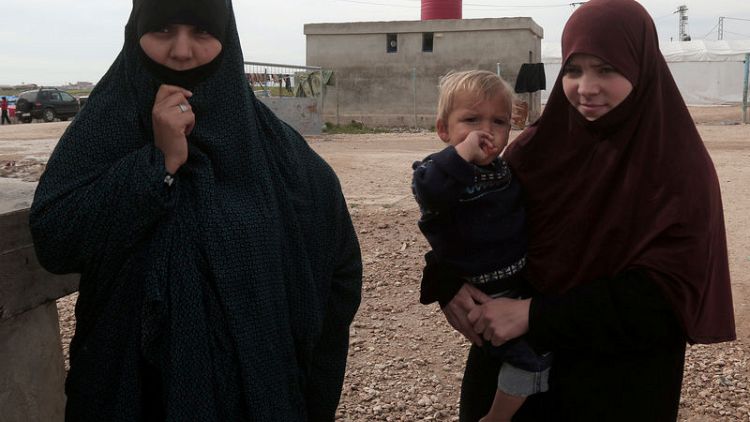AIN ISSA, Syria (Reuters) - The Reuters team sat down in the dimly lit room in the camp in Ain Issa, northern Syria, and waited for the two Belgian sisters-in-law to arrive.
Our reporters in Brussels had been following their story for months: the women had joined Islamic State in Syria at its height, surrendered to Kurdish forces in 2017, and one of their mothers was trying to get them home with their six children.
Now Tatiana Wielandt and Bouchra Abouallal had agreed to speak to us face to face in the camp, a fenced-in expanse of tarpaulin tents close to the Turkish border under the control of their captors, the U.S.-backed SDF.
We had their location. But questions remained - not least how freely would they be able to talk, surrounded by their guards?
A security official brought them in with Wielandt's youngest son - blond, barefoot and clinging to her robe - then left them alone for an hour-long interview.
Our team in Syria - correspondent Ellen Francis and video journalist Issam Abdallah - began by trying to make sure the women wanted to be there, watching for any signs that they were under mental or physical strain or under the sway of the guards.
"You can never be fully sure people in captivity are speaking of their own free will, but we still did our best to establish that they had consented," said Francis. "We explained who we were and what we planned to report, trying to give them the chance to back out."
The team’s reports made the context of interviews clear for the reader, with the TV footage showing the fenced-in life at the camp.
COMMON GROUND
Francis and two women were all the same age, 26 - a small piece of common ground that helped ease some awkwardness.
Abouallal and Wielandt said they had renounced Islamic State and were prepared to let their children go home without them if the Belgian government continued to block their return.
The interview went to the heart of a debate still raging about what to do with fighters' families trying to get back to Europe, amid fears that they would bring their militancy back with them.
As everyone relaxed, the conversation ranged wider. The women, wearing hijab but showing their faces, asked for news from the outside world and shared anecdotes about their children's troubles living in the camp.
They talked about falling in love with the two men they followed to Syria - Wielandt married Abouallal's brother when they were teenagers. Both men died within a year of arriving in Syria.
"I felt we managed to have a long, relaxed conversation given all the circumstances - the chaos of the camp, the reality that they were in custody," Francis said.
"We are there to move a story forward, not to judge. We regularly report on people from all sides of a conflict, asking them about their choices without dehumanising them."
(Reporting by Ellen Francis in Beirut and Alissa de Carbonnel in Brussels; Editing by Andrew Heavens)
